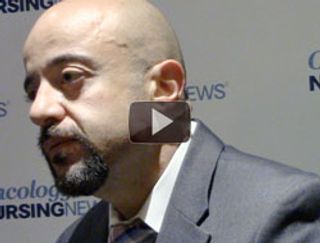
Hematology
Latest News

Venetoclax and Rituximab Continues to Best Bendamustine/Rituximab in Relapsed/Refractory CLL
Latest Videos

More News

Resistance training and walking can be beneficial for patients with multiple myeloma.

Patients who received pomalidomide, bortezomib, and dexamethasone achieved a median overall survival of 35.6 months compared with 31.6 months among patients treated with bortezomib and dexamethasone.

In a single-center retrospective analysis, the median progression-free survival among patients with multiple myeloma treated with teclistamab was 4.7 months.

The FDA has approved bosutinib to treat pediatric patients with Philadelphia chromosome–positive, chronic-phase chronic myelogenous leukemia.

Elizabeth Aronson, MSN, FNP-BCN, OCN, shares what stood out to her about the phase 2 MonumenTAL-1 study assessing talquetamab in multiple myeloma.

Data suggest that frontline treatment brentuximab vedotin elicits superior outcomes in patients with Hodgkin Lymphoma, regardless of PET2 results.

Quizartinib plus standard intensive induction and consolidation therapy was associated with longer survival rates in patients with FLT3-ITD–positive acute myeloid leukemia.

The FDA has approved motixafortide in combination with filgrastim to mobilize hematopoietic stem cells in multiple myeloma transplantation, based on findings from the phase 3 GENESIS trial.

Although survival is improving overall, disparities continue to grow.

A total of 58.5% of patients who received luspatercept remained red blood cell (RBC) transfusion independent for 12 weeks or more.

Elizabeth Aronson, MSN, FNP-BCN, OCN, discusses how the recent approvals of elranatamab and talquetamab are changing the treatment landscape for patients with multiple myeloma.

The rate of minimal residual disease-negative complete remission was 34.4% with ponatinib vs 16.7% with imatinib.

Patients with heavily pretreated relapsed/refractory multiple myeloma, including those with lenalidomide and pomalidomide-refractory disease, showed encouraging responses with mezigdomide plus dexamethasone.

Patients with high-risk classical Hodgkin lymphoma who experience a slow early response to frontline chemotherapy may benefit from the addition of pembrolizumab to COPDAC-28 consolidation.

Black patients with multiple myeloma may be at a higher-risk for bortezomib-induced peripheral neuropathy compared with non-Black patients.

The FDA has approved luspatercept to treat anemia in patients with lower-risk myelodysplastic syndromes.

Among patients with symptomatic Waldenström macroglobulinemia, the very good partial response rate with zanubrutinib was 36.3% vs 25.3% with ibrutinib.

The FDA has granted ivosidenib priority review designation based on data from a phase 1 trial.

The FDA has granted accelerated approval to elranatamab-bcmm to treat adults with relapsed or refractory multiple myeloma who have already undergone 4 prior lines of treatment.

Patients with relapsed/refractory primary mediastinal large B-cell lymphoma achieved antitumor responses with pembrolizumab.

Amanda Warner, MS, BSN, RN, OCN, who is manager of research informatics & real world evidence with Florida Cancer Specialists & Research Institute, provides an in-depth look at teclistamab in a downloadable fact sheet.

Talquetamab has received accelerated approval for patients with relapsed or refractory multiple myeloma.

The resubmitted biologics license application for remestemcel-L has been issued a complete response letter.

The FDA has issued a complete response letter to the biologics license application for denileukin diftitox.

The first-line combination of magrolimab and azacitidine will no longer be investigated in patients with higher-risk myelodysplastic syndrome.








































































































